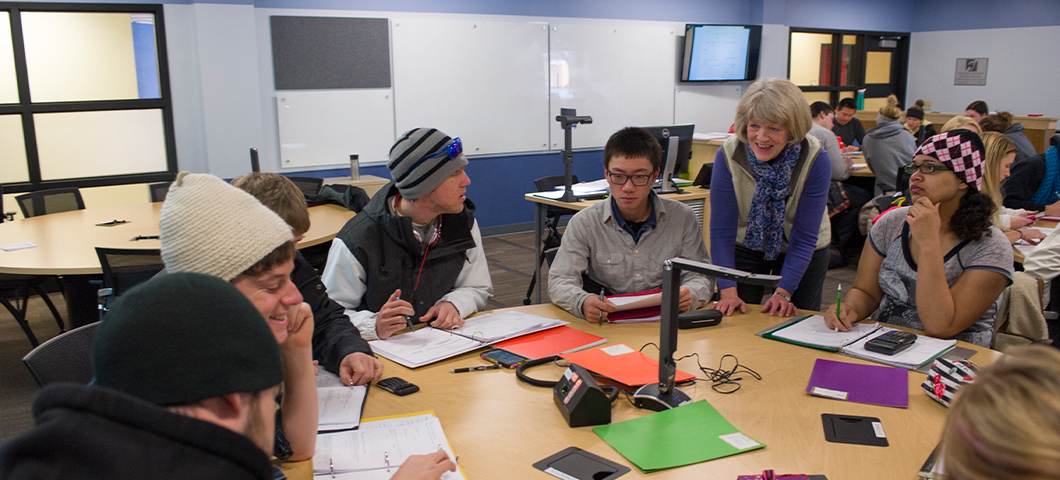Guide to Facilitating Challenging Conversations
Download a PDF version of this guide

University classrooms offer unique spaces for exploring topics with people who hold different, even conflicting, perspectives. These conversations provide invaluable opportunities to identify and understand uneven distributions of power, to develop relationships of integrity, and to strengthen the muscles of empathy, generosity, and democratic spirit necessary for all to flourish.
Good facilitation does not require that you have expertise on all topics. Instead, focus on developing skills to identify and manage sensitive topics, cognitive dissonance, and emotionally charged conversations. The following tips provide educators with strategies to prepare for challenging conversations before they occur, to navigate difficult moments during these conversations, and to recuperate after challenging conversations.
Preparing for challenging conversations BEFORE they occur.
- Think about how you are situated vis-à-vis different structures of privilege and oppression. Let your students know that you are aware of power differences that might be at play in your conversations. Invite them to participate in identifying issues that could exacerbate difficult conversations.
- Think about how to model beginning from a place of curiosity, respect, vulnerability, and collaboration. The way you initiate and engage in a difficult conversation sets the tone for the rest of the discussion. Students will take their cue from you.
- Be proactive in structuring your classroom space. Consider a seating structure (e.g. a circle) or creating smaller discussion groups to enable face-to-face conversations. Move around the classroom so that you are interacting with everyone in a personal and close-up manner.
- Work with your students to develop a plan or a class contract for how best to navigate potential heated moments, micro or macroaggressions, triggering topics, outrage, and other kinds of emotional distress. See the Guide to Inclusive Teaching for more information on class contracts and brave space agreements.
- Practice! The more challenging conversations you have with friends, family, colleagues, strangers, and students, the easier it becomes.
Navigating difficult moments DURING challenging conversations
- Lean into conflict. Recognize that challenging conversations are important. Students want and need your guidance.
- Remember that you do not have to be an expert on the topic to be a great facilitator. Discomfort can lead to improved critical thinking skills, which are particularly useful for evaluating conflicting sources of information.
- Focus on modeling good behaviors. Be curious and practice active listening. Suggest that your students do the same. Be open to other perspectives. Consider sharing personal stories. Recognize your own privileges and bias. Commit to research a topic if you don’t know enough about it.
- Avoid asking students to speak on behalf of their entire identity group.
- To diffuse heated moments, consider these strategies. Pause the conversation and give students 5-10 minutes to process their thoughts and feelings on paper. Create a plan for you and/or your students to research the topic and bring information back to the group.
- Consider these strategies for addressing an offensive statement or challenging moment. (1) Acknowledge the emotions in the room. (2) Acknowledge any damages or offense that some might be feeling. (3) Humanize those who are affected. (4) Ask questions and/or reframe the conversation.
- Toward the end of a challenging conversation, summarize and synthesize the main points and disagreements. Acknowledge that there doesn’t need to be a “winner” or a definitive resolution.
Repairing and recuperating AFTER challenging conversations
- Check in with yourself. Take stock of how you are feeling. What went well? What could have gone better? Is more follow-up needed? What can you learn?
- Be aware that challenging conversations about identity and power can trigger past trauma. Recuperating requires that you practice self-care, check in with others, and connect them to resources if necessary. Counseling and Psychological Services offers these resources.
- Debrief with someone who has experience with difficult conversations and is willing to process the discussion with you.
- Check in with your students. Don’t assume that a student is upset or that you know why. Ask open-ended questions and give them space to explain.
Commit to Ongoing Learning about Facilitating Challenging Conversations
Learning to facilitate challenging conversations is difficult but rewarding work that is worth the extra effort. Honor your efforts and enjoy watching your students grow.
- Read up on common communication issues in Pace and Kyeli Smith’s The Usual Error: Why We Don’t Understand Each Other and 34 Ways to Make It Better.
- Read up on vulnerability, courage, shame, empathy, and difficult conversations in Brene Brown’s Dare to Lead: Brave Work. Tough Conversations. Whole Hearts. Watch her 20-minute TED talk, “The Power of Vulnerability.”
- Check out the web site for Facing History and Ourselves – especially their webinars on “Navigating Difficult Conversations.”
- Learn more about talking and thinking about race in Ijeoma Oluo’s book, So You Want to Talk about Race and Kimberle Crenshaw’s book, Seeing Race Again: Countering Colorblindness Across the Disciplines.
- To learn more about recognizing your privilege, read Peggy McIntosh’s widely available article, “White Privilege: Unpacking the Invisible Knapsack.”
- Learn more about implicit bias at Harvard University’s Project Implicit web site.
Special thanks to the MSU working group of faculty and staff who generously shared their time and knowledge to compile this guide: Hilary Burt, Katey Plymesser, Levenae Buggs, Meredith Knowles, Nora Smith, Rebecca Jones, and project lead Karen deVries.
